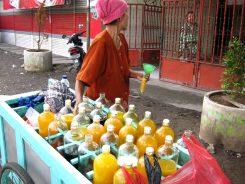As we near the end of 2020 with no sign of an end to the COVID-19 pandemic, lockdowns and travel restrictions remain in many parts of the world, including Southeast Asia. For footloose travellers used to a hyper-mobile lifestyle of traversing far-flung destinations, one slightly bizarre solution to their unexpected grounding has come in the form of “flights to nowhere”.
Flights to nowhere are exactly what they sound like: the opportunity to view breathtaking landscapes from a plane, without the complication of having to land in another country. For fans of themed travel, Taiwan’s Eva Air offers a Hello Kitty option. For the “environmentally conscious”, there are alternatives where the flights don’t take off at all, ranging from a fully-fledged simulated flight experience complete with a boarding pass and safety announcements, to a more modest three-course meal on a stationary A380.
Inevitably, flights to nowhere are not cheap. A business class seat on a flight of fancy can be three times higher than the average monthly wage in Malaysia – and some have sold out within minutes, perhaps even faster than most clearance sales of genuinely cheap goods.
Well-heeled travellers may justify this escapism as a way to help the airline industry and its workers. There is no need to delve into this debate other than to note that it reinforces the late anthropologist David Graeber’s argument that societies where “bullshit jobs” of all pay grades are rife are also likely to be societies with extreme concentrations of wealth.
However, the flight-to-nowhere phenomenon is about more than selling pandemic-era escapism to the bored habitués of business lounges. The real absurdity of a flight to nowhere lies less in a culture of self-indulgent excess than in attempts to escape the everyday, non-jet-set reality. It promotes the insidious and pernicious view that the everyday experience of being at home is so dreaded, mundane and oppressive that it should be avoided at all costs.
Of course there are legitimate reasons for people to seek respite from day-to-day drudgery, but seeing the everyday as something to be avoided prevents us from learning some of the most important lessons COVID-19 has to offer us.
The “everyday” happens every day for a reason. The daily routines of cooking, cleaning and caring are crucial for sustaining human lives. When they take place at home or within communities, these activities are often unpaid and serve as a concealed subsidy for a whole range of profitable ventures. COVID-19 has given us the opportunity to really see this generally invisible, typically unpaid, genuinely essential care and domestic work, and to view in two important ways.
First, the pandemic has caused unpaid care and domestic work to intensify its role as a hidden subsidy to absorb the economic shocks of COVID-19. When people lose their jobs and wages, they or other members of their households have to find ways to manage expenditure by doing more household production, such as doing more cooking, undertaking their own house repairs, and providing childcare at home.
Former UK prime minister Gordon Brown and the political economist Lord Skidelsky have recently written about the need to see job creation as an essential fiscal stimulus during the pandemic and after. The irony, of course, is that for countless unpaid or poorly paid care and domestic workers, the work they do every day has never really needed job creation schemes. The unemployment crisis has only increased their everyday burden in a gendered and racialised way: more dishes for housewives to wash, and more rubbish for low-paid migrant workers to collect.
Second, households have increasingly become a site for production as offices, factories and retailers are forced to close, shattering the illusion that the domestic space is only a site for social reproduction. Both firms and individuals have adjusted to the pandemic-imposed lockdowns by moving office work to makeshift home offices, and scaling up small-scale home-based production. Direct exchange between households, facilitated by online orders and deliveries, has partially replaced conventional spaces for exchange, such as restaurants and supermarkets.
The failure to recognise the quintessential role of households in the broader sustenance of capitalism and human life is not a new one, as radical feminists such as Silvia Federici, Selma James and Mariarosa Dalla Costa memorably argued in the 1970s. They foregrounded households as fundamental to how we should understand the economy, and began the “wages for housework” campaign to call for housework to be recognised as work.
While their specific call to pay wages for housework may not have materialised in the way it was originally envisioned, namely a weekly wage paid by the government, their argument that housework should be given political recognition as work continues to be relevant. During the pandemic, everyday production and social reproduction have steadfastly kept human life going amid tumbling GDP and stock markets – even as the everyday remains uncounted, unvalued and unremunerated.
Radical reimagination, not radical escape
There are countless lessons to be drawn from how societies have responded to COVID-19. One of the most important is that we urgently need a radical reimagination of the everyday, rather than a radical escape from it. Especially as so many of us cannot afford to escape, be it in reality or in the business-class comfort of a luxurious flight to nowhere.
In Southeast Asia, countless millions of people do not have the luxury to escape from the everyday, owing to the ever-present demands of care work and minimal, if any financial recompense(?). The International Labour Organisation’s report Care Work and Care Jobs shows that four countries in Southeast Asia – Cambodia, Lao People’s Democratic Republic, Myanmar and the Philippines – have care dependency ratios (CDR) higher than the global total ratio in 2015. CDR is a crude measure used to gauge society’s care burden.
The unequal sharing of the care burden also tells us that more women than men are constrained by the demands of the everyday. According to the ILO report, in 2012, women in Thailand spent about 2.9 hours per day on unpaid care work, while men spent only 56 minutes, about three times less. In Myanmar, in 2015, 68.3% of women cited unpaid care work as the main reason for staying outside the labour force, compared to just 11.8% of men. Similar gender gaps can be seen throughout Southeast Asia, differing only in terms of magnitude.
Oxfam’s recent report Making Care Count: An Overview of the Women’s Economic Empowerment and Care Initiative provides a short but succinct overview of how the situation has moved on since the 1970s radical feminist critique of care work. It highlights the core importance of shifting social norms and broadening participation to complement investments in care infrastructure, suggesting that care work needs more hands on deck, and less fetishisation of the flight deck.
Revolution from the kitchen: women and ecological responses to COVID-19
The kitchen has become a centre of social solidarity from which women are making invaluable contributions to the COVID-response.
Other policy proposals currently being discussed include providing guaranteed basic income to carers, bailing out households, industrialising housework and instituting community care. All of these require not only a bolder rethinking of how we can organise care and social relations, but also involve state funding as the key redistributive mechanism, and require symbolic recognition of the role of social reproduction in capitalism.
In Southeast Asia, as more women have entered the workforce, migrant workers have moved around the region to provide care. The deplorable conditions of these embodied mobilities, which COVID-19 has served to make visible, represent both a flight to the everyday driven by poverty, and a flight from the everyday predicated on affluence. It is clear that a bolder rethinking of care must also transcend borders.
One can envisage many objections to the calls for a radical reorganising of the care economy, including those that raise the spectre of economic recession and the need for fiscal restraints. But if we are wondering how some of the proposals mentioned above can be funded, perhaps the best place to start is by looking at the wealth concentration, everyday inequalities and gendered divisions of labour that lurk behind all those flights to nowhere.
 Facebook
Facebook  Twitter
Twitter  Soundcloud
Soundcloud  Youtube
Youtube  Rss
Rss 



